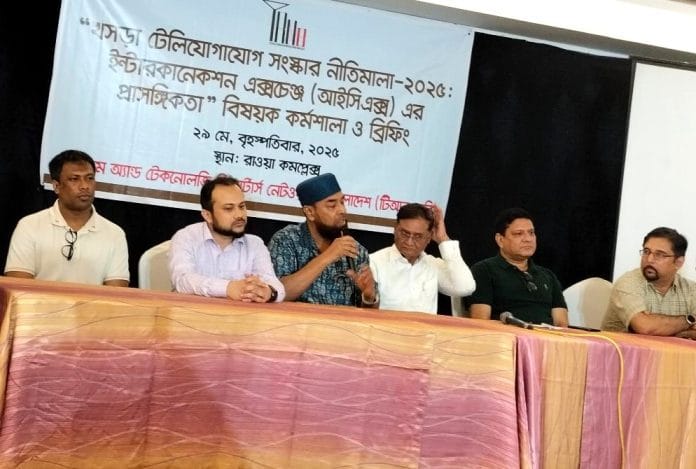The government may lose up to Tk 300 crore in annual revenue and force the closure of around 100 locally grown companies if it endorses the proposed Telecom Reform Policy 2025, according to Interconnection Exchange (ICX) operators.
The concern was raised at a workshop titled ‘Draft Telecom Reform Policy 2025: Relevance of ICX’, organised by the Telecom and Technology Reporters Network Bangladesh (TRNB). The event was moderated by TRNB President Samir Kumar Dey and welcome addressed by General Secretary Masuduzzaman Robin.
It brought together telecom stakeholders, journalists, and industry experts to deliberate on the implications of the draft policy.
ICX operators, who claim to have contributed Tk 5,862 crore in revenue over the past 14 years, said the proposed reforms by the Bangladesh Telecommunication Regulatory Commission (BTRC) would enable mobile network operators (MNOs) to monopolize telecom services by bypassing the ICX system.
They warned that this move could not only reduce government revenue to just Tk 16–17 crore annually from MNOs, but also pose serious threats to national security by removing an essential layer of surveillance and control.
The operators also cautioned that as many as 700 engineers could lose their jobs if the ICX framework is dismantled.
Speakers at the event emphasized the critical role of ICX in revenue assurance, fraud prevention, and digital surveillance. They argued that eliminating ICX would increase technical complexity and operational costs for more than 50 voice service providers, including mobile, PSPAN, and IPTSP operators.
Brig Gen (retd) Mostafizur Rahman, President of the Telecommunication Infrastructure Operators of Bangladesh (TIOB), said abandoning the locally developed telecom architecture in favor of MNO-dominated networks could endanger both economic interests and national security.
Brig Gen (retd) Khurshid Alam, Treasurer of TIOB, noted that the existing telecom framework was built to support local businesses, combat money laundering, and protect national interests. He said the industry had recently invested Tk 130 crore in transitioning from TDM to IP technology based on government instructions, an investment now at risk due to sudden policy shifts.
He added that the draft policy would allow MNOs to operate at the international gateway level without separate licensing, effectively sidelining ICX. “This move is designed to hand control of telecom services to mobile operators under the guise of a foreign-influenced policy,” he alleged.
Ahmed-ur-Rahman, Head of ICX Operations at Agni Systems, stated that over Tk 1.15 crore in daily SMS traffic currently goes unaccounted for due to ICX bypassing. Proper routing through ICX could yield an additional Tk 85 crore in government revenue annually, he added.
The workshop also highlighted ICX’s essential role in international call routing and digital surveillance—functions deemed vital to maintaining Bangladesh’s sovereignty and national security.
Despite these concerns, the draft amendment to the Telecommunications Act, currently under review by BTRC, proposes removing ICX from the licensing framework altogether—raising fears among experts about potential long-term damage to the telecom ecosystem.
Among others, VoiceTel CEO Mustafa Mahmud Hossain, Bangla ICX Director Hasibur Rahman, Banglatelecom CEO Brig Gen (retd) Md Abdul Hanna,BanglaTel CEO Mohd. Mokhlesur Rahman and Imam Network Ltd CEO M Nurul Alam were present at the workshop.

